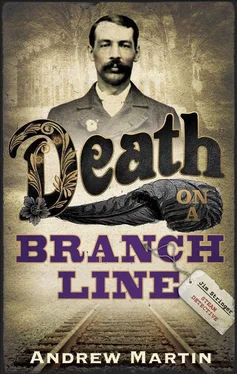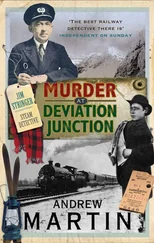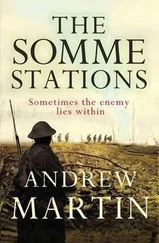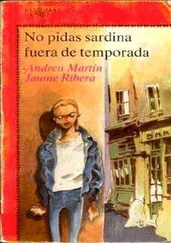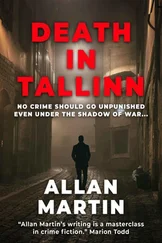Andrew Martin - Death on a Branch line
Здесь есть возможность читать онлайн «Andrew Martin - Death on a Branch line» весь текст электронной книги совершенно бесплатно (целиком полную версию без сокращений). В некоторых случаях можно слушать аудио, скачать через торрент в формате fb2 и присутствует краткое содержание. Жанр: Классический детектив, на английском языке. Описание произведения, (предисловие) а так же отзывы посетителей доступны на портале библиотеки ЛибКат.
- Название:Death on a Branch line
- Автор:
- Жанр:
- Год:неизвестен
- ISBN:нет данных
- Рейтинг книги:5 / 5. Голосов: 1
-
Избранное:Добавить в избранное
- Отзывы:
-
Ваша оценка:
- 100
- 1
- 2
- 3
- 4
- 5
Death on a Branch line: краткое содержание, описание и аннотация
Предлагаем к чтению аннотацию, описание, краткое содержание или предисловие (зависит от того, что написал сам автор книги «Death on a Branch line»). Если вы не нашли необходимую информацию о книге — напишите в комментариях, мы постараемся отыскать её.
Death on a Branch line — читать онлайн бесплатно полную книгу (весь текст) целиком
Ниже представлен текст книги, разбитый по страницам. Система сохранения места последней прочитанной страницы, позволяет с удобством читать онлайн бесплатно книгу «Death on a Branch line», без необходимости каждый раз заново искать на чём Вы остановились. Поставьте закладку, и сможете в любой момент перейти на страницу, на которой закончили чтение.
Интервал:
Закладка:
The sound of the crane was by degrees drowned out by the beat of a louder engine, and I saw the 12.27 coming around the track-bend in the woods, two minutes late. As I crossed the barrow boards to the smaller platform, I watched the bundles of black smoke enter the woods by different gaps in the trees, like so many parcels being sorted.
The train stopped on the ‘up’, and a carriage door opened.
Well, the first man down was the Chief, and I felt a great sense of relief and duty-done at the sight of him. He was holding a kitbag, and looking at his watch. He hadn’t seen me yet, for I stood by the guard’s van, and he’d been riding in the carriage behind the engine.
He held his trilby hat, and I looked with enjoyment at his battered face, and thin strands of hair lashed by sweat to his great dinty head. At first he might charge me with having dragged him away from his Saturday dinner-time bottle of wine in the Station Hotel for no good reason. But I was sure he’d see the sense of the wire I sent once I’d explained all.
The Chief gave a glance along the platform, and would have spotted me at that moment had not a younger man stepped down from the train, blocking his line of vision. I’d barely had time to take in this new arrival when another man came, and then everything went wrong, for a dozen carriage doors opened and a dozen or more young blokes climbed down. They were all in the twenties or early thirties. Some wore hooped caps, and all carried long canvas bags, some with bat handles protruding. They were all bloody cricketers and they were all bloody suspects. I cursed the North Eastern Railway for bringing them.
To turn up in this way at a village with the shadow of an execution hanging over it did not seem right. They all stood on the platform, joshing and larking about, and the Chief was fighting his way through, coming towards me and looking none too pleased. Cricket wasn’t one of his games. As he closed on me, I pulled off my cap by way of a salute, and started in straightaway by asking whether he’d had the story of Hugh Lambert’s lay-over at York station, at which the Chief shook his head briskly, and spat.
The train was noisily taking its leave (nobody had boarded), and the platform was clearing as the cricketers streamed over the barrow boards towards the station yard and I began telling my tale to the Chief. He listened with head bent forward and eyes closed as though making a great effort to understand.
Or was he drunk?
That was not out of the question. Saturday was the Chief’s principal boozing day, and his breath came over a little sour.
The Chief was nodding occasionally, and looking over towards the station yard, where a charabanc had drawn up. It had many seats — looked like a sort of omnibus with the top deck sliced off. At the wheel sat that bad shilling of Adenwold, the fucking vicar, the Reverend Martin Ridley, who was climbing down now as the cricketers straggled across the yard towards him. He moved towards the first of the blokes and greeted him by miming the bowling of a very fast ball, which caused a good deal of dust to fly up in the station yard and the vicar’s hat to fall off.
As I carried on with my explanations, the Chief was agitatedly moving his hand over his head, shifting the strands of sweaty hair, so that they were one minute like so many tangled S’s, the next drawn straight as railway lines. Station master Hardy had abandoned his seat on the steam crane, and was watching us across the tracks from the booking office doorway; porter Woodcock also looked on from the ‘up’ platform, where he’d advanced a little way towards his pot of white-wash, but had still not laid a hand on the brush. I did not believe that either could hear my talk with the Chief.
The porter had made no move to cross the tracks to help the Chief with his bags, so my governor had evidently failed the test. Any one of the cricketers might have passed it, but none had looked in the least need of assistance.
The charabanc was now driving away from the station yard amid the sound of more explosions. The scale of it seemed out, for it did look a normal-sized car at first glance — and yet there were more than a dozen men in it.
The little station was left silent except for the high birdsong, and the ceaseless rattling of my own voice as I went on with my story.
The clock on the ‘up’ said 12.35. Station master Hardy remained at the doorway of the booking office looking, as he ever did, in fear of some catastrophe coming around the corner. Porter Woodcock had disappeared.
‘It’s a good job you were in the office when the message came,’ I said to the Chief.
He gave a grunt. ‘Now where’s the Hall?’ he enquired.
‘We’ll go there directly,’ I said.
‘Don’t get past yourself,’ said the Chief.
I turned about and eyed him.
He said, ‘It’ll only take one of us to see whether there’s anything in this.’
Well, it came to this: he hadn’t believed my story.
… Or did he want to keep the business for himself? In the past, when I’d struck something big, he’d given me a pretty free hand. But this was very big: one death certain, and another threatened. And the gentry were involved.
I’d had visions of walking up to the Hall with the Chief. We’d take the place over. He’d be my authority, but I’d be in the lead. We’d get John Lambert out of the clutches of Usher, force him to say what he knew — the thing that Usher wanted him to keep back — and then we’d lay hands on the true killer, which for preference would be Usher himself.
I was in a stew of sweat; I dragged my handkerchief over my brow, and could think of nothing better to say than, ‘It’s too hot.’
‘You want to get your coat on,’ said the Chief.
‘Well, it’s not as if I’m on duty, is it?’
The Chief made no reply but lit another cigar.
‘Have you come armed?’ I asked.
He eyed me over the flaring Vesta. ‘Are you trying to scare me, sonny?’
Our pint of the day before had been amiable enough, but I had perhaps bested the Chief over the matter of the bank’s man on the platform. I’d pointed out his error, and that might have rankled.
‘The Hall is that way,’ I said, indicating the direction of the second village green. ‘It’s signposted.’
I was buggered if I was going to tell him about The Angel, or offer to take his bag up there.
After the Chief had quit the platform, the station master called across the tracks to me:
‘Was he the one?’
‘Eh?’ I called back. ‘How do you mean?’
‘The one that was at Tamai?’
It was unlike Hardy to be coming forward. He seemed galvanised for the first time since my arrival. He ignored Woodcock, who sat on the bench, smoking.
‘How did you know?’ I asked Hardy, as I cut across the barrow boards.
‘Well,’ he said, as I gained the ‘up’, ‘he looked the part… about the right age…’
‘What do you mean by that?’ I said, challenging him — although to say anything to Hardy was to challenge him.
‘Oh,’ he said, and he took a step back into the booking office.
Somehow emboldened by the Chief’s rejection, I stepped into the booking office after him.
Trapped heat and dust made the place suffocating. The tall desk was still covered with a jumble of papers, but some of the books had now been stacked on the counter where stood the ABC telegraph machine. But that must be dead since the line was down. As before, the arrangement of soldiers had pride of place on the strong table, and it seemed that Hardy was minded to talk about it.
‘The push for Khartoum,’ Hardy said, indicating the soldiers on the table. ‘Thirteenth of March, 1884, east coast of the Sudan. I show the British square,’ he ran on, as he knelt down beside the table, quite heedless of his uniform. His head appeared over the brown-coloured board like a desert moon. As he spoke, he touched the tops of soldiers’ pith helmets with his fingertips, moving from one to another like a kind of blessing.
Читать дальшеИнтервал:
Закладка:
Похожие книги на «Death on a Branch line»
Представляем Вашему вниманию похожие книги на «Death on a Branch line» списком для выбора. Мы отобрали схожую по названию и смыслу литературу в надежде предоставить читателям больше вариантов отыскать новые, интересные, ещё непрочитанные произведения.
Обсуждение, отзывы о книге «Death on a Branch line» и просто собственные мнения читателей. Оставьте ваши комментарии, напишите, что Вы думаете о произведении, его смысле или главных героях. Укажите что конкретно понравилось, а что нет, и почему Вы так считаете.
